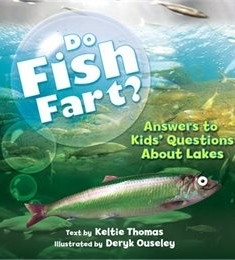- Home
- Tutorial
- Resource Guides
- Focus Areas
- LSF Programs
-
Professional
Development - Review Process
-
A project of LSF

Search for Resources
Description
The hilarious title of this book is a clue to the engaging content contained within. “Do Fish Fart?” provides answers to some of the most entertaining student questions regarding aquatic life while delivering a serious message about freshwater conservation. The amusing text with entertaining pictures, cartoons and puzzles will delight students as they discover the underwater world of lakes and learn how they can do their part to help keep our watersheds clean and healthy.
Click here for more information regarding the author's books, school visits, or teaching resources.
General Assessment
Recommendation of how and where to use it
This book supports middle school science and geography outcomes related to habitats, ecosystems and sustainability. The content could also be used to introduce a field trip to a local river or lake to study aquatic life and measure water quality indicators such as temperature, pH and turbidity.
Students could develop personal water conservation plans by tracking water use and implementing best practices like reducing the use of plastics at home. Classroom action projects could include such tasks as planting trees in the riparian zone of a local river or campaigning for reduced fertilizer use on lawns and gardens.
An interesting community-based project could have students creating maps of local water supply sources and using these maps to inform residents about where their drinking water comes from to highlight the importance of pollution prevention. The class could even work with a local waste disposal company to host a hazardous waste event where materials like old paint are collected and disposed of properly.
Relevant Curriculum Units
The following tool will allow you to explore the relevant curriculum matches for this resource. To start, select a province listed below.
- Step 1Select a province
- Alberta
- Step 2Select a grade level
- Grade 4
- Step 3Select a subject
- Science
- Step 4Relevant matches
- Earth Systems: Understandings of the living world, Earth, and space are deepened through investigating natural systems and their interactions.
- Grade 6
- Step 3Select a subject
- Science
- Step 4Relevant matches
- Living Systems: Understandings of the living world, Earth, and space are deepened through investigating natural systems and their interactions
- British Columbia
- Manitoba
- New Brunswick
- Newfoundland & Labrador
- Northwest Territories
- Nova Scotia
- Nunavut
- Ontario
- Step 2Select a grade level
- Grade 4
- Step 3Select a subject
- Science & Technology
- Step 4Relevant matches
- Life Systems: Habitats and Communities
- Grade 6
- Step 3Select a subject
- Science & Technology
- Step 4Relevant matches
- Life Systems: Biodiversity
- Prince Edward Island
- Quebec
- Step 2Select a grade level
- Grade 5
- Step 3Select a subject
- Science & Technology
- Step 4Relevant matches
- Living Things
- Grade 6
- Step 3Select a subject
- Science & Technology
- Step 4Relevant matches
- Living Things
- Saskatchewan
- Yukon Territory
Themes Addressed
Citizenship (1)
- General Guide to Taking Action
Water (4)
- Water Cycle
- Water Quality
- Water Use
- Watershed Protection

